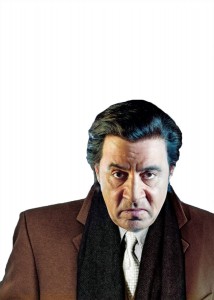Online streaming plays with originality
Our generation has made it clear hundreds of times over that removing that pesky human element from every interaction possible — in the noble name of increased efficiency — is a number one priority.
We approve of technology that enables us to do or watch what we want, when we want — business hours or programming schedules be damned. And though time waits for no man, we demand that TV shows heed our pause buttons and wait for us.
The Internet seems to have heard our call. Earlier this month, Netflix, the company whose model of delivering DVDs straight to customers’ mailboxes put rental giants like Blockbuster on the fast track to bankruptcy, released an eight-episode “season” of Lilyhammer in one big bundle. The show, starring The Sopranos’ Steven Van Zandt as a former Mafioso relocated to Norway through a witness protection program, is a Netflix original series with a decidedly less than original fish-out-of-water premise.
Just one week later, the well-trafficked online video streaming service Hulu debuted the pilot episode of Battleground, a political dramedy shot in the mockumentary format that’s practically inescapable on television today. Unlike Lilyhammer, Battleground — which follows a crew of scrappy campaign staffers working to elect its underdog candidate to one of Wisconsin’s Senate seats — is taking a slightly more traditional approach to distribution, making one new half-hour episode available every Tuesday exclusively on Hulu.
The significance of Netflix’s and Hulu’s maiden ventures into the realm of original programming cannot be overstated. Spokespersons from Netflix, for instance, have made no secret of the fact that, with their subscription-based model, they fancy themselves more akin to HBO or Showtime than to any other Web-based platforms.
Comparing itself to premium cable networks is telling of Netflix’s eventual aspirations. Some are quick to forget that HBO, the reigning king of high-quality original television, began its life as the “Home Box Office.” As Netflix and Hulu would do many years later, HBO initially contented itself with its role as a distributor of content that had previously debuted elsewhere — mostly movies that had enjoyed typical theatrical releases.
But in the late ’90s, the burgeoning network boldly turned a successful business model on its head with an initial foray into original scripted content with now-timeless programs such as Sex and the City and The Sopranos.
The platform might be different, but with the release of Lilyhammer and Battleground, it looks as if Netflix and Hulu are eager to claim their place in the original content market.
In much the same way that DVR technology was initially vilified by the television industry for allowing audiences to fast-forward through advertisements, broadcast networks’ bread and butter, Hulu and Netflix have yet to worm their way into TV executives’ good graces.
As it stands, the video hits racked up by a show’s Hulu audience isn’t factored into the all-important Nielsen ratings that determine the price to air a commercial during a given show, and Netflix has justifiably been accused of cutting into sales of complete season DVDs.
Time and again, young consumers have shown that they’re open to doing things differently than their parents and that mindset almost certainly extends to how they watch their shows. With Netflix and Hulu officially joining the production fray, the line is being blurred between traditional TV series and new Web series.
The implications of Web-based ventures getting into the business of content production extend beyond the financial. Hulu and Netflix also have the capacity to fundamentally alter the way audiences consume a serialized narrative.
Netflix, for instance, has done more than anyone to give rise to the phenomenon of “binge watching” — defined by Los Angeles Times film critic Mary McNamara as “any instance in which more than three episodes of an hour long drama or six episodes of a half-hour comedy are consumed at one sitting.”
By offering up a complete series in one fell swoop, Netflix is merely enabling the decline of our national attention span and stoking the fires of our already out-of-control insistence on instant gratification.
For now, TV networks — broadcast and cable alike — have no real reason to upgrade their Hulu and Netflix threat rating. On the basis of the few episodes that have been made available, Hulu’s Battleground seems to have a lot of charm, but it’s only one episode in. And although Netflix does have a few projects on the horizon — including a remake of the British drama House of Cards and a long-awaited revival of the comedy that got away, Arrested Development — it’s going to be a long time before it gains the critical mass of original content to compete with TV networks.
If traditional networks want to hold on to audiences in the future, they have to understand that viewers will follow great shows and engaging stories — no matter what screen size it leads them to.
Louis Lucero II is a senior majoring in environmental studies. His column “Small Screen, Big Picture” runs Tuesdays.

The way the general public consumes media is definitely changing especially now that it’s getting easier and easier to get customized content in-home. I think it’s cool that more people are trying to come out with original shows but don’t think Netflix should be too focused on it since their already small streaming library is about to take a hit from the loss of Starz content. I’m just glad I have Blockbuster @Home instead. I was happy to switch from Netflix when my employer, DISH, announced it. They have such a better selection of movies and I’m not worried about contracts being pulled. I think Netflix should focus on growing their customer base by increasing their streaming movie selection and not just on pleasing their existing customers.